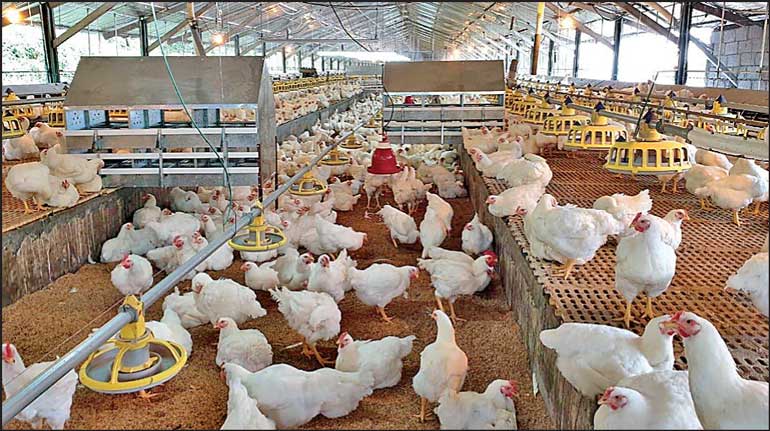Wednesday Feb 25, 2026
Wednesday Feb 25, 2026
Friday, 17 June 2022 00:00 - - {{hitsCtrl.values.hits}}

A commercial breeder farm in Sri Lanka - Pic by Dilan Satharasinghe
By Charumini de Silva
The All Island Poultry Association yesterday called on the Government to create business conducive policies and protect local industries without killing the geese that lays the golden eggs.
“The poultry industry’s lucrative potential is blocked by a shortage of animal feed and import tariffs attached to it. Sri Lanka being a bird flu-free country has an excellent opportunity to export to Singapore after Malaysia banned its chicken and egg exports.
The 15 large-scale local companies are geared to double their capacities to give a tough competition to the only contender —Thailand,” AIPA Chairman Ajith Gunasekara told the Daily FT.
He said the industry has already invested over Rs. 260 billion, but more incentives are needed for industry stakeholders to tap into the lucrative export markets, ahead of a global food crisis.
“Our industry exports eggs, chicken, and value-added products such as processed meat of around 1,000 tons per month and earn over $ 1 million to Nepal, Maldives, and the Middle East countries. The export companies are equipped with all necessary certificates and standards, whilst they can easily increase the production to 10,000 tons per month whilst bringing in 10-20 times more foreign exchange if regulations can be favourable,” he explained.
Sri Lanka produces around 18,000 tons of chicken meat and over 21 million eggs per month, of which the majority is locally consumed as it is considered the most affordable source of protein for daily nutrients.
He said the industry is strangled with much-needed animal feed for years, though AIPA had pledged to the Government that they would buy as much maize as available at a reasonable fixed price from local farmers.
“Feed price is the biggest component of the cost of production of both chicken meat and eggs. Sri Lanka is still failing to produce the required animal feed material quantity locally and the issue remains the same for years, restricting the growth of the industry,” he lamented.
As the annual requirement of $ 350 million is unable to be secured given the economic crisis, Gunasekara said the industry had requested the Government to at least facilitate $ 30 million to fulfil the monthly demand for animal feed.
Maize is considered the high-quality cereal for poultry feed which provides energy, while soya meal is the other key nutrient. Soybean meal is 100% imported from the US and maize is partly imported from India. However, with a drop in local maize production, the industry is now compelled to import it 100% from India with restrictions on the letter of credit (LCs), open accounts, and documents against acceptance (DA).
“To boost exports, the industry has requested that imported animal feed be considered as a tax rebate after export, to which all other authorities have given its nod except the Finance Ministry. We hope to receive a favourable response soon. We also encourage maize cultivation for the next Maha season to assure the sustainability of poultry production and to buy directly from the farmers,” he said.
Adding on to the existing woes, Gunasekara said 40% of the SMEs have given up on the industry following multiple crises, which has led to a 40% drop in the egg and a 30% dip in chicken production. The poultry industry has 300,000 people directly and indirectly engaged in the industry which includes over 100 families.
Against this backdrop, the AIPA also warns price of chicken meat and egg prices are likely to further increase amidst animal feed shortage and cost of production.
“The price of an egg in the market at present ranges between Rs. 45-50 and a kilo of skinless chicken is being sold at Rs. 1,200. Given the drop in production, the price of an egg will shoot over Rs. 50 and a kilo of chicken about Rs. 1,500. Thus, we call on authorities to intervene and list them as essential commodities,” he added.
Noting that egg and chicken meat are the cheapest protein sources available, he warned the price hike will lead to protein deficiencies, especially among children, and will grow as a social issue.